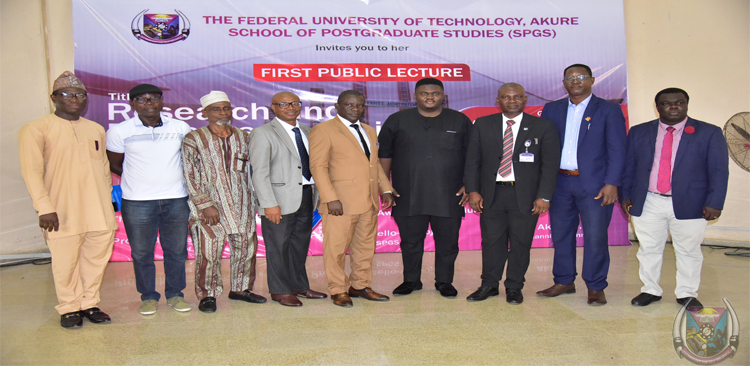

- CEO, Capital Sage Holding The founder and Group Managing Director of Capital Sage Holdings, the holding company of Johnvents Group, Mr. John Alamu has said that the nexus of academic and industrial research fuels entrepreneurship and this will in turn stimulate economic growth and advance economic and social equity. He made the submission while delivering the First annual lecture of the School of Post Graduate Studies, Federal University of Technology Akure on the 5th of October 2023. Speaking on the theme “Research and Entrepreneurship: Keys to Driving the Economy of Developing Nations,” he said, research provides the knowledge and expertise to identify market gaps, understand consumer behavior, and develop innovative solutions. According to him, research helps mitigate risks by providing a deeper understanding of the chances of success.
Using his company as a case study he said “In 2022 research revealed that Nigeria exports over 90% of cocoa unprocessed depriving ourselves of the numerous benefits of cocoa and limiting the economic prosperity potential of consuming our cocoa locally. This informed our forward integration plans and our company has gone on to introduce a chain of cocoa-based products. These ventures are not isolated initiatives but integral parts of a grander vision. It is a vision of a prosperous nation where we harness our resources, talents and innovations to solve our challenges and uplift our communities.” Alamu reiterated that, “Research backed entrepreneurship can help us in these economically challenging times. Globally nations that invest in research a precursor to entrepreneurship often have an edge in economic competitiveness. Research is not confined to the halls of academia. it is a powerful engine of entrepreneurship and economic development”.
The Guest speaker said “Agri-preneurs have also developed an agriculture technology model that are reinventing our approach to agriculture by developing innovative solutions to improve farming practices, increase crop yields and reduce post-harvest losses and funding. These technologies and funding models help ensure a consistent and high-quality food supply”. He pointed out that the path to harnessing entrepreneurship for nation-building is not without challenges adding that regulatory hurdles, access to finance, and the need for entrepreneurial education are just a few of the obstacle’s entrepreneurs face. He however added that these challenges are insurmountable as they present opportunities for innovation, policy reforms, and collaboration.
Drawing his lecture to a conclusion Alamu said, “despite the challenges that developing nations grapple with, they hold immense potential regardless. Amid seeming hopelessness, developing nations possess an untapped entrepreneurial potential that can catalyze economic development fostering innovation, productivity, and job creation, which are pivotal elements of any thriving economy”.
Speaking at the lecture the Vice Chancellor Professor Adenike Oladiji FAS, represented by the Deputy Vice Chancellor, Development, Professor Sunday Oluyamo said “Breaking new grounds or advancing into unknown territories often comes with many challenges. One must develop uncommon competencies, particularly boldness and indefatigability in the face of opposing and discouraging forces. However, being optimistic and resolute to succeed ensures victory, ultimately. The public lecture of today surely is a milestone”. She said “Universities all over the world are preoccupied with the tripodal mandate of knowledge generation (Research) knowledge impartation (Teaching) and knowledge application (community service). The task of knowledge generation in particular distinguishes great universities in the world. In nations where universities are highly research-active and a strong link exists between universities and industries, rapid economic growth follows”. The Vice Chancellor said, “It is axiomatic, therefore, that the leading economies of the world to grow their GPD significantly, a solid collaboration between the scholarly world and the industries must be established; research endeavors should be encouraged and the link between research institutions and the industries should be strengthened”.
Dean, School of Postgraduate Studies, Professor Oluayo Bello-Olusoji said ‘the university was established for the purpose of teaching, research and community development and one of the ways to achieve these three purposes is by connecting the town and the gown to drive the purposes towards fulfilment. Hence a step to do this, is this public lecture”. He said FUTA has been waxing stronger despite the multifaceted challenges inhibiting the growth of higher education in the country. The school has produced highly skilled professionals and scholars in fulfillment of its mandate. The Dean commended the university management for its unwavering support to the school and also appreciated all the past deans of the school for their concerted efforts in ensuring that the School of Post Graduate studies achieves its set goals.